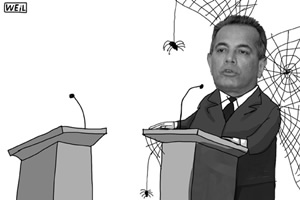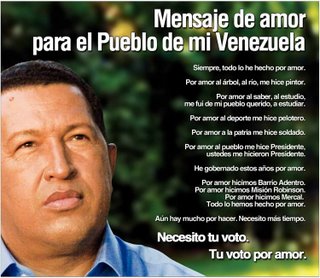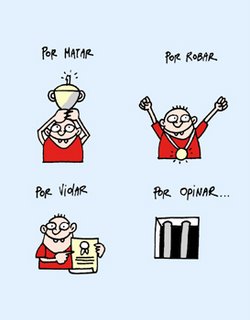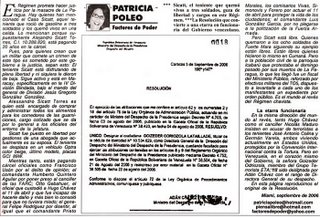The New York Times
October 29, 2006
U.S. Investigates Voting Machines’ Venezuela Ties
By TIM GOLDEN

The federal government is investigating the takeover last year of a leading American manufacturer of electronic voting systems by a small software company that has been linked to the leftist Venezuelan government of President Hugo Chávez.
The inquiry is focusing on the Venezuelan owners of the software company, the Smartmatic Corporation, and is trying to determine whether the government in Caracas has any control or influence over the firm’s operations, government officials and others familiar with the investigation said.
The inquiry on the eve of the midterm elections is being conducted by the Committee on Foreign Investment in the United States, or Cfius, the same panel of 12 government agencies that reviewed the abortive attempt by a company in Dubai to take over operations at six American ports earlier this year.
The committee’s formal inquiry into Smartmatic and its subsidiary, Sequoia Voting Systems of Oakland, Calif., was first reported Saturday in The Miami Herald.
Officials of both Smartmatic and the Venezuelan government strongly denied yesterday that President Chávez’s administration, which has been bitterly at odds with Washington, has any role in Smartmatic.
“The government of Venezuela doesn’t have anything to do with the company aside from contracting it for our electoral process,” the Venezuelan ambassador in Washington, Bernardo Alvarez, said last night.
But Smartmatic was a little-known firm with no experience in voting technology before it was chosen by the Venezuelan authorities to replace the country’s elections machinery ahead of a contentious referendum that confirmed Mr. Chávez as president in August 2004.
Seven months before that voting contract was awarded, a Venezuelan government financing agency invested more than $200,000 into a smaller technology company, owned by some of the same people as Smartmatic, that joined with Smartmatic as a minor partner in the bid.
In return, the government agency was given a 28 percent stake in the smaller company and a seat on its board, which was occupied by a senior government official who had previously advised Mr. Chávez on elections technology. But Venezuelan officials later insisted that the money was merely a small-business loan and that it was repaid before the referendum.
With a windfall of some $120 million from its first three contracts with Venezuela, Smartmatic then bought the much larger and more established Sequoia Voting Systems, which now has voting equipment installed in 17 states and the District of Columbia.
Since its takeover by Smartmatic in March 2005, Sequoia has worked aggressively to market its voting machines in Latin America and other developing countries. “The goal is to create the world’s leader in electronic voting solutions,” said Mitch Stoller, a company spokesman.
But the role of the young Venezuelan engineers who founded Smartmatic has become less visible in public documents as the company has been restructured into an elaborate web of offshore companies and foreign trusts.
“The government should know who owns our voting machines; that is a national security concern,” said Representative Carolyn B. Maloney, Democrat of New York, who asked the Bush administration in May to review the Sequoia takeover.
“There seems to have been an obvious effort to obscure the ownership of the company,” Ms. Maloney said of Smartmatic in a telephone interview yesterday. “The Cfius process, if it is moving forward, can determine that.”
The concern over Smartmatic’s purchase of Sequoia comes amid rising unease about the security of touch-screen voting machines and other electronic elections systems.
Government officials familiar with the Smartmatic inquiry said they doubted that even if the Chávez government was some kind of secret partner in the company, it would try to influence elections in the United States. But some of them speculated that the purchase of Sequoia could help Smartmatic sell its products in Latin America and other developing countries, where safeguards against fraud are weaker.
A spokeswoman for the Treasury Department, which oversees the foreign investment committee, said she could not comment on whether the panel was conducting a formal investigation.
“Cfius has been in contact with the company,” said the spokeswoman, Brookly McLaughlin, citing discussions that were first disclosed in July. “It is important that the process is conducted in a professional and nonpolitical manner.”
The committee has wide authority to review foreign investments in the United States that might have national security implications. In practice, though, it has focused mainly on foreign acquisitions of defense companies and other investments in traditional security realms.
Since the political furor over the Dubai ports deal, members of Congress from both parties have sought to widen the purview of such reviews to incorporate other emerging national security concerns.
In late July, the House and the Senate overwhelmingly approved legislation to expand the committee’s scope, give a greater role to the office of the director of national intelligence and strengthen Congressional oversight of the review process.
But the Bush administration opposed major changes, and Congressional leaders did not act to reconcile the two bills before Congress adjourned.
Foreigners seeking to buy American companies in areas like defense manufacturing typically seek the committee’s review themselves before going ahead with a purchase. Legal experts said it would be highly unusual for the panel to investigate a transaction like the Sequoia takeover, and even more unusual for the panel to try to nullify the transaction so long after it was completed.
It is unclear, moreover, what the government would need to uncover about the Sequoia sale to take such an action.
The investment committee’s review typically involves an initial 30-day examination of any transactions that might pose a threat to national security, including a collective assessment from the intelligence community. Should concerns remain, one of the agencies involved can request an additional and more rigorous 45-day investigation.
In the case of the ports deal, the transaction was approved by the investment committee. But the Dubai company later abandoned the deal, agreeing to sell out to an American company after a barrage of criticism by legislators from both parties who said the administration had not adequately reviewed the deal or informed Congress about its implications.
The concerns about possible ties between the owners of Smartmatic and the Chávez government have been well known to United States foreign-policy officials since before the 2004 recall election in which Mr. Chávez, a strong ally of President Fidel Castro of Cuba, won by an official margin of nearly 20 percent.
Opposition leaders asserted that the balloting had been rigged. But a statistical analysis of the distribution of the vote by American experts in electronic voting security showed that the result did not fit the pattern of irregularities that the opposition had claimed.
At the same time, the official audit of the vote by the Venezuelan election authorities was badly flawed, one of the American experts said. “They did it all wrong,” one of the authors of the study, Avi Rubin, a professor of computer science at Johns Hopkins University, said in an interview.
Opposition members of Venezuela’s electoral council had also protested that they were excluded from the bidding process in which Smartmatic and a smaller company, the Bizta Corporation, were selected to replace a $120 million system that had been built by Election Systems and Software of Omaha, Neb.
Smartmatic was then a fledgling technology start-up. Its registered address was the Boca Raton, Fla., home of the father of one of the two young Venezuelan engineers who were its principal officers, Antonio Mugica and Alfredo Anzola, and it had a one-room office with a single secretary.
The company claimed to have only two going ventures, small contracts for secure communications software that a Smartmatic spokesman said had a total value of about $2 million.
At that point, Bizta amounted to even less. Company documents, first reported in 2004 by The Herald, showed the firm to be virtually dormant until it received the $200,000 investment from a fund controlled by the Venezuelan Finance Ministry, which took a 28 percent stake in return.
Weeks before Bizta and Smartmatic won the referendum contract, the government also placed a senior official of the Science Ministry, Omar Montilla, on Bizta’s board, alongside Mr. Mugica and Mr. Anzola. Mr. Montilla, The Herald reported, had acted as an adviser to Mr. Chávez on elections technology.
More recent corporate documents show that before and after Smartmatic’s purchase of Sequoia from a British-owned firm, the company was reorganized in an array of holding companies based in Delaware (Smartmatic International), the Netherlands (Smartmatic International Holding, B.V.), and Curaçao (Smartmatic International Group, N.V.). The firm’s ownership was further shielded in two Curaçao trusts.
Mr. Stoller, the Smartmatic spokesman, said that the reorganization was done simply to help expand the company’s international operations, and that it had not tried to hide its ownership, which he said was more than 75 percent in the hands of Mr. Mugica and his family.
“No foreign government or entity, including Venezuela, has ever held any stake in Smartmatic,” Mr. Stoller said. “Smartmatic has always been a privately held company, and despite that, we’ve been fully transparent about the ownership of the corporation.”
Mr. Stoller emphasized that Bizta was a separate company and said the shares the Venezuelan government received in it were “the guarantee for a loan.”
Mr. Stoller also described concerns about the security of Sequoia’s electronic systems as unfounded, given their certification by federal and state election agencies.
But after a municipal primary election in Chicago in March, Sequoia voting machines were blamed for a series of delays and irregularities. Smartmatic’s new president, Jack A. Blaine, acknowledged in a public hearing that Smartmatic workers had been flown up from Venezuela to help with the vote.
Some problems with the election were later blamed on a software component, which transmits the voting results to a central computer, that was developed in Venezuela.
Simon Romero contributed reporting from Caracas, Venezuela.

More on the topic. A paper from Dr.Felten, Dr.Rubin and Dr. Stubblefield about the Venezuelan referendum.
Do you know that is practically impossible to detect electronic voting fraud?
Thanks to Julie for all the info about this.











